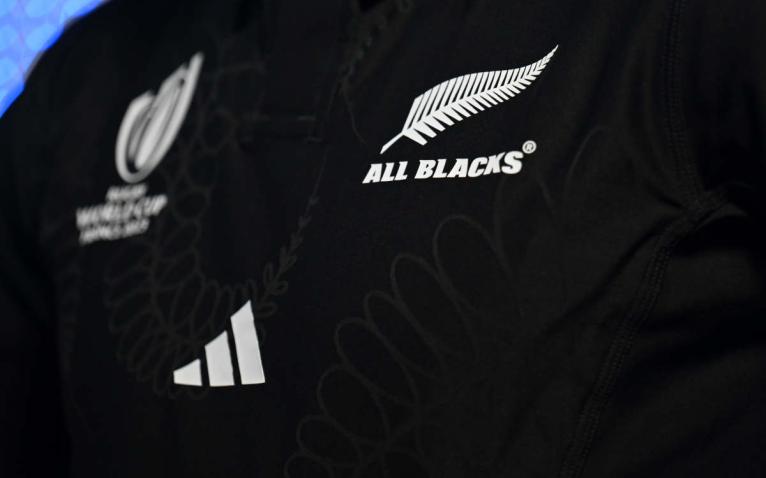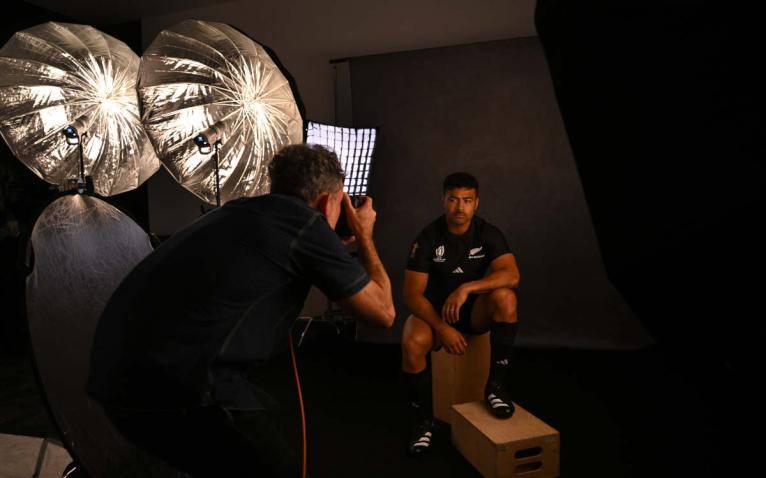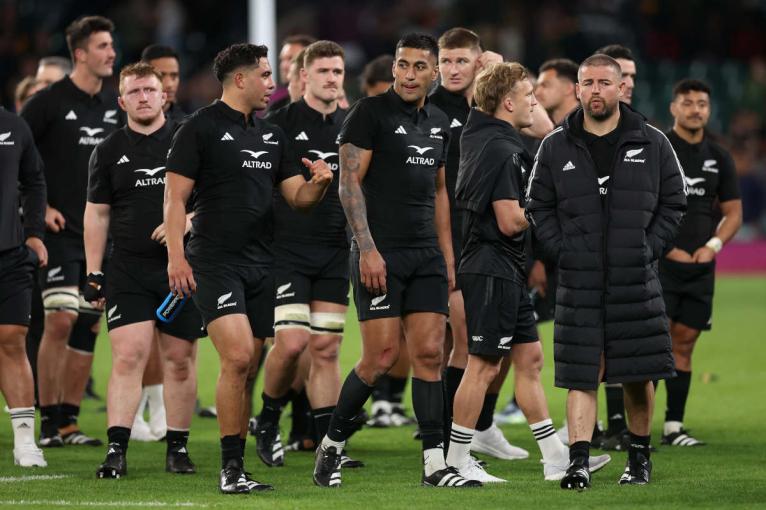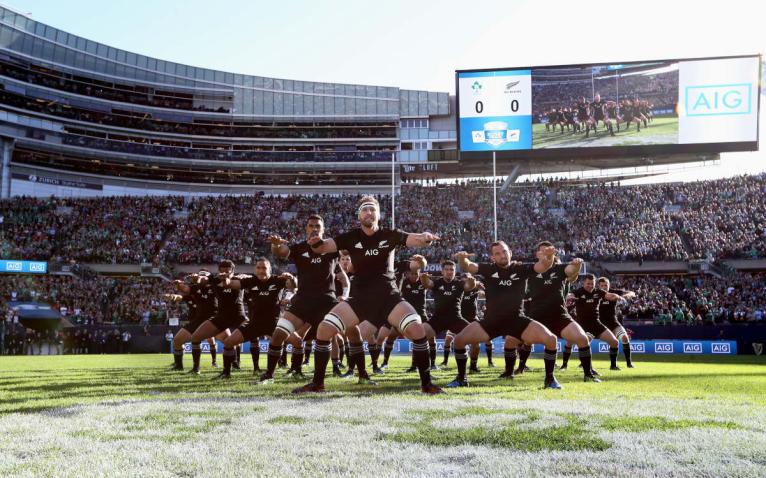The All Blacks have long-lived under a unique pressure to deliver victories. The New Zealand public are notoriously demanding, and for generations the All Blacks have talked about the motivating power that has come with trying to live up to expectations.
But in the last five years or so, a new pressure has been squeezing the All Blacks and it is a force that is proving powerful and relentless and one that may build irresistible momentum should New Zealand win the World Cup this year.
This new predator that’s attacking the All Blacks is the need for the team to make money.
Professional rugby around the world has been feeling the pain from Covid shutdowns, high inflation and the cost of living, but in New Zealand, the overall financial picture has remained relatively positive.
When Covid hit, New Zealand Rugby had $105m in cash reserves to weather the storm, but more impressive has been the revenue growth the national body has enjoyed in the last four years.
In 2019, NZR took $189m of total income, a figure which jumped to $270m in 2022.
What drove much of that growth were new deals with UK petrochemical firm Ineos and French building services conglomerate Altrad, who both bought naming rights to the All Blacks kit.

Other sponsors, including Japanese pharmaceutical giant Taisho and German tech company SAP have paid millions to buy an association.
In 2021, a new broadcast deal kicked in which saw local TV firm Sky TV increase its annual payment from about $70m a year to $100m a year for content rights.
And in mid-2022, a $200m cash injection came from US fund manager Silver Lake which has bought a near six per cent stake in the commercial assets of NZR.
The money has flooded in, but all this new and increased investment has come with a significant increase in the amount of time players are having to spend on commercial activity.
Under the terms of the collective agreement there is a limit on how much time players can be used by commercial partners.
NZR+ has been launched with the aim of winning five million registrations. This new platform, which will likely live stream All Blacks tests in time, is aiming to engage new and existing fans
These limits aren’t being breached, but All Blacks manager Darren Shand says that more players are getting closer to maxing out their hours.
But there is yet more time still being allocated to internal media projects as a new content hub, NZR+ has been launched with the aim of winning five million registrations.
This new platform, which will likely live stream All Blacks tests in time, is aiming to engage new and existing fans with behind-the-scenes content, archival footage and the occasional documentary-style in-depth look at a specific campaign.
All sorts of agreements and assurances have been made about where cameras can and can’t be and what is off limits, but there will inevitably be both a stress and time factor involved in creating and managing this content.

And there are other new commercial ventures being launched by NZR, such as the All Blacks Performance Labs initiative that went live earlier this year.
It’s an executive coaching programme built on selling corporate leaders the values and ideas that have made the All Blacks so successful, with former NZR chief commercial officer Richard Thomas telling the New Zealand Herald last year: “What we are trying to do is blend all those learnings from the team environments into the day-to-day realities of these businesses that we talk to.
“What do these ideas mean as they try to achieve things in their executive teams or their boardrooms and translating all that high-performance thinking back into the world of business executives.”
The money is flowing in, with predictions NZR will turnover $350m by 2025, but increasingly inside the team, the players and coaches are struggling to balance their high-performance needs with the increasing commercial demands.
This commercial incursion is something former All Blacks coach Steve Hansen warned about when he stood down from the job in 2019.
Whether people like it or not, the only real commercial commodity that the NZR has is the All Blacks and the All Blacks brand has therefore been put around the Sevens, the Black Ferns, the Maori. Personally I think that is where most of the pressure came from
Steve Hansen
He said that in his last two years in the job, he was constantly battling against commercial requests which he felt were going to impact the performance of the team.
“The one thing that changed the most was the commercial side of the game because of the need for money,” Hansen said in Steve Hansen: The Legacy.
“You have high performance on one side and commercialism on the other.
“Whether people like it or not, the only real commercial commodity that the NZR has is the All Blacks and the All Blacks brand has therefore been put around the Sevens, the Black Ferns, the Maori and personally I think that is where most of the pressure came from, because it became a real battle to get the balance right. And once the balance goes in favour of commercialism over high performance then it is interfering with how you can play.”

And since he left, those pressures have intensified, and they will become yet greater again if the All Blacks win this year’s World Cup.
As former NZR chief executive Steve Tew said in 2011: “The more you win, the more people want to be associated with your organisation, team and brand.
“The strength of the All Blacks brand is it wins at a rate of around 80 per cent of games and in the professional era that has risen to the mid-80s. That is unparalleled by any other sporting entity at our kind of level.
“When we’re trying to get into particular sponsors’ doors, that is what gets us through the door.”
While it’s true that big brands have invested in the All Blacks because of the team’s legacy built over an extraordinarily long period, being world champions will inevitably create yet more commercial opportunities for NZR.
But the question that needs to be asked, is how much is too much? Can the All Blacks continue to be squeezed the way they are to help their employer make money?
The evidence is real that commercial pressure is being felt and detrimentally impacting performance.
Between 2012 and 2016, when NZR wasn’t as cash hungry as it is now, the All Blacks lost just four Tests.
But by 2017, when the financial picture changed and NZR admitted it needed more money to meet increasing costs, the All Blacks results deteriorated.
“Suddenly we are flying around the world three times a year, or four with Super Rugby and it just turned it into a massive thing. You can’t help but notice and think, ‘I hope they are making some money from this because we are doing a tonne of work for them’.”
The All Blacks started playing more tests – for money – often travelling to the USA or Japan to do so.
The extra games came with extra travel, and this was also at a time when Super Rugby was operating with 18 teams, across five countries.
“We noticed it,” says Kieran Read, who captained the All Blacks between 2016-2019. “Guys noticed we were playing these extra tests and it made it quite a massive year.
“Suddenly we are flying around the world three times a year, or four with Super Rugby and it just turned it into a massive thing, and you can’t help but notice and thinking, ‘I hope they are making some money from this because we are doing a tonne of work for them’.”
NZR also agreed a deal with Amazon to film a behind the scenes documentary in 2017 – a decision not many players or coaches agreed with and one that had a more damaging impact than is realised.

The presence of cameras never sat well with the team nor the coaching staff and Sir Wayne Smith, who served as All Blacks head coach between 2000 and 2001, and then as assistant between 2004 and 2011, before returning as defence coach in 2015 through to 2017, found it a distraction.
“If you compare that with 2017 where we had something that I was against, but it got voted on, which was being followed around by Amazon to do that documentary,” he says.
“I found that intrusive and it was difficult. It changed behaviours to the extent that guys that you would joke with on the field previously, wouldn’t come over because it would come over on my mic what they were saying. It changed everything.
“It was a microcosm I think of where the pressures have ramped up. As the money has got bigger the obligations have got bigger and that is just the nature of it.”
Since 2017, the All Blacks have lost 15 times and drawn four times.
A win ratio that was in excess of 90 per cent between 2012 and 2016, dropped to 75 per cent between 2017 and 2022.
Now the commercial floodgates have fully opened and there are concerns about how well the All Blacks are going to cope in 2024 if they do indeed win the World Cup and secure yet more financial investment.
It is not proving easy to balance commercial ambition with high-performance success and there is a feeling one or the other is soon going to have to give way.


There's a very easy way everyone is going to cope, Ian Foster is leaving and Razor is replacing him.
What a dumb comment.
Thats what I thought. You’re a bug bird with a very little head that you like to bury in the ground. Thank you for clearing that up for me. Meanwhile, I’m hoping that the AB’s go well. With or without the likes of you.
Ostrich?
Denial..Amnesia..of what exactly. what are you on? Hoping for some intelligent comments thats all.
Jeez mate. So many things played out in public. What's going on? Denial? Amnesia? Or just dumber?
No need to worry, the All Blacks are a long shot 4th favourite so very unlikely to win the wc. So those extensive pressures wont come to bare. But a good article though, which does make an extremely valid point. I would have added that since Foster took over the win ratio has dropped to 69%, which is not going to have the mega corporations knocking at the door.
Favouritism at RWCs tends to be a death knell, reference ABs 1995, 1999, 2003, 2007, 2019.
Some of the sponsorship arrangements are a disgrace. At a time when areas of the country are still cleaning bio after catastrophic climate events, the All Blacks are helping to greenwash one of the worlds champion polluters. This is another example of how weak the journalism is on these issues.
This writer has long swapped access to the All Blacks for favourable fluff pieces
Since 2020, the Foster "brand" has been killing the on-field product, nothing to do with travel &/or extra games in the name of commercialism. What's his winning %, 68% I think I read somewhere.
Incredible how Ian Foster does everything by himself! Some Kiwi’s are just dumb!
Sell out your team to commercial business, that's how to run a successful international rugby team 👍🤣
No, the team is already a successful "commercial business" so it can't be "sold out" can it? The article's about getting the balance right.